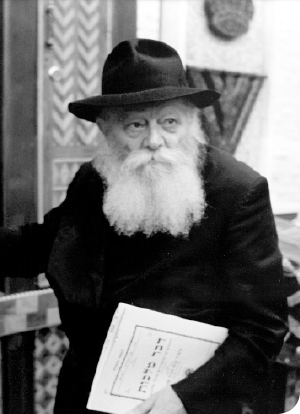Although, she was not actually deserving of punishment for any infraction, the mere entry into this phase of life, where punishment is a possible outcome, represents a decline…
Translated by Boruch Merkur
 B’Reishis 23:1: The life of Sara was one hundred years and twenty years and seven years; [these were] the years of the life of Sara.
B’Reishis 23:1: The life of Sara was one hundred years and twenty years and seven years; [these were] the years of the life of Sara.
Rashi: “And the life of Sarah was one hundred years and twenty years and seven years”: The reason that the word “years” was written after every digit is to tell you that every digit is to be expounded upon individually: when she was one hundred years old, she was like a twenty-year-old regarding sin. Just as a twenty-year-old has not sinned, because she is not liable to punishment, so too when she was one hundred years old, she was without sin. And when she was twenty, she was like a seven-year-old as regards to beauty. (B’Reishis Rabba 58:1)
“the years of the life of Sara”: All of them were equally good.”
24. Rashi comments that when Sara was “one hundred years old, she was like a twenty-year-old regarding sin … And when she was twenty, she was like a seven-year-old as regards to beauty.” This teaching, however, is stated only by association, b’kaf ha’dimyon; the intention here is not that these stages in her life were [truly] equal. And it is not only in spiritual matters that Sara’s years were not actually equal but even in the simple, literal sense. As we have discussed (Shabbos Parshas Noach, beg.), Rashi’s commentary accords to both the esoteric dimension of the Torah and its literal level of interpretation.
We cannot say that throughout her life, Sara actually experienced the same degree of purity from sin and that she possessed the same degree of beauty. The very fact that after twenty Sara entered the age of accountability, being subject to punishment (for sin), she fell from her previous stage of perfect innocence. Although, she was not actually deserving of punishment for any infraction, the mere entry into this phase of life, where punishment is a possible outcome, represents a decline. (The precedent for this principle is the law of s’chach, covering for a sukka. Something that is predisposed to receive impurity (muchshar l’kabel tuma), although it never actually became impure, is ineligible for use as s’chach.) Similarly with regard to beauty. After the age of seven, one is no longer in a stage of life that is optimal for physical attractiveness. A special exegesis is required to derive that at age twenty, Sara maintained beauty like a seven year old, illustrating that there was a decline in her beauty.
We say that at twenty, Sara was only “like” a seven-year-old, with a kaf ha’dimyon (for in actual fact, she possessed extraordinary beauty and was without sin even at the age of one hundred), but the stages in her life were not actually equal.
25. Moreover, we cannot say that all stages of Sara’s life were all equal with regard to beauty and avoidance of sin, because – regarding beauty – there was a time when Sara decreased in beauty even in the manifest sense [i.e., not just in potential], as she acknowledges about herself with the word “blosi (withered)” [i.e., aware of the aged condition of her body]: Sara laughed, saying, ‘After I have withered will I now have smooth skin?’” (B’Reishis 18:12) And regarding sin, the Torah states that “Sara laughed” (B’Reishis 18:12) and “Sara denied” (B’Reishis 18:15), as per Rashi’s literal level of interpretation (as opposed to Ramban’s opposing view). Also from the verse, “now I know that you are a beautiful woman,” according to the interpretation of Maor Einayim (discussed Shabbos Parshas Lech Lecha, Section 11), when they approached Mitzrayim, (Avrohom and) Sara experienced an actual [spiritual] descent. Regarding that stage of her life we cannot say even b’kaf ha’dimyon, by association, that Sara was like she was at an optimal stage.
Nevertheless we say that Sara’s years were all “equally good”: they were all equal in the sense that they were all good. Notwithstanding the fact that there were times of decline, even these difficult, challenging moments were good, for there is an advantage of iskafia (confronting challenges) in comparison with the Divine service of tzaddikim (who are beyond confrontation; see Tanya Ch. 27). Thus, the Divine intent was carried out (even) through instances of decline – they were “good.”
In this sense, the [seemingly redundant] phrase, “the years of the life of Sara,” indicates that they all contributed to a general principle – that in terms of fulfilling the Divine intent, “All of them were equally good.” Here the Torah speaks not only of the aspect of the essence that transcends division but also after it has been divided – that b’pnimius, in an inner sense, they were “the years of the life of Sara,” all part of the general principle of being in accordance with the Divine intent.
(From the address of Shabbos Parshas Chayei Sara 5725; Sichos Kodesh 5725, pg. 128-129)